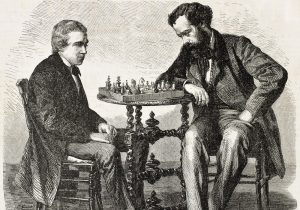Call us now:
Chess is a mental exercise that challenges and strengthens the brain in numerous ways. Here’s a glimpse of the cognitive benefits you can reap from playing chess:
- Enhanced Cognitive Skills: Chess stimulates the growth of dendrites, which are neural pathways in the brain. This improved connectivity leads to sharper cognitive abilities overall.
- Boosted Memory and Concentration: The strategic nature of chess demands memorization, planning, and focus. Regular chess practice enhances these cognitive functions, allowing you to retain information more effectively and sustain concentration for longer periods.
- Critical Thinking and Problem-Solving: Every chess move requires careful consideration and anticipation of your opponent’s moves. This constant problem-solving exercise hones your critical thinking skills and equips you to tackle challenges strategically.
- Increased Creativity and Innovation: Chess encourages you to think outside the box and explore unconventional strategies. This fosters creativity and innovative thinking that extends beyond the chessboard.

Social and Emotional Benefits of Chess
The positive impact of chess extends to your social and emotional well-being:
- Improved Decision-Making: Chess teaches you to weigh risks and rewards, evaluate consequences, and make sound decisions under pressure. These skills translate into better decision-making in everyday life.
- Sportsmanship and Respect: Chess etiquette emphasizes respect for your opponent and adherence to the rules. Through playing chess, you cultivate good sportsmanship and learn to win and lose with grace.
- Stress Reduction and Focus: The focused concentration required during chess can act as a form of meditation, reducing stress and promoting mental clarity.
- Academic Advantages: How Chess Benefits Learning
Studies have shown that chess instruction can have a positive impact on academic performance:
- Improved Reading and Presentation Skills: Chess requires you to read and interpret the chessboard, plan your moves, and potentially discuss strategies. This can enhance your reading comprehension and presentation skills.
- Enhanced Memory and Focus: As mentioned earlier, the memory and focus benefits of chess can translate to improved academic performance in all subjects.
- Problem-Solving and Critical Thinking: The problem-solving and critical thinking skills developed through chess can be applied to various academic challenges, allowing you to approach problems strategically and creatively.

Ready to Experience the Benefits of Chess?
Chess offers a multitude of benefits for people of all ages. Whether you’re looking to sharpen your cognitive skills, improve your focus, or simply enjoy a stimulating mental challenge, chess is a rewarding pursuit.
Explore the fascinating history of chess through its greatest champions!
Chess Organizations & Affiliates: Delve into the global chess community and connect with fellow chess enthusiasts!



